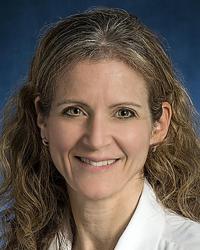Takeaway
In critical care, we often make life-saving decisions with incomplete information. Teamwork is essential, and sometimes acting on our best-educated guess is the only option. These moments remind us of life’s fragility and the importance of trusting our instincts and each other.

Passion in the Medical Profession | October 23, 2024 | 2 min read
By Edana Mann, MD, Johns Hopkins Medicine
I was caught off guard when informed that the patient being wheeled into my critical care room on an EMS gurney was a middle-aged physician—someone who could have easily been me. I’m not sure why it surprised me. Maybe because, as doctors, we’re trained to treat illness, not succumb to it, or maybe it was because he looked like he’d been put through the wringer with a face covered in blood and clothes a crumpled mess. But there he was, not just ill but actively dying—hypotensive, tachycardic, and deteriorating by the minute. He’d collapsed while treating a patient, and it was now up to us to figure out why.
Using every bedside tool available to stabilize and diagnose—oxygen, multiple pressors, an arterial line, and bedside ultrasound—we listened to each other and brainstormed to make an educated guess: a massive pulmonary embolism was the consensus of the team. He was far too unstable to be moved to the scanner for confirmation. So, we made the call: thrombolytics. We understood the risks—he’d hit his head when he collapsed and had a deep laceration across the forehead—but with time running out, we had to act on our best guess because, at that moment, it was all we had.
In the end, you could say we were “educated lucky.” He survived a massive pulmonary embolism and eventually received a thrombectomy. Our best guess had bought him the time he needed—and, in this case, it turned out to be the right call.
A few days later when I visited him in the ICU, he remembered hearing my voice urging him to hold on. “I almost died,” he said, his voice heavy with the lingering fear of that moment.
I let his words settle in before responding, “True, but you didn’t.” As I exited the room, it dawned on me that this kind and grateful person was still here because of the trust we share in our team and the power of collective problem-solving. That exchange has stayed with me—a reminder of how often we must make best guesses that tread the line between life and death. So often, we share moments with our patients when they are at their most vulnerable and looking to us for hope and guidance. It’s easy to become overconfident and believe we have all the answers. This encounter is a reminder of how “educated lucky” we were and the need to always remain humble as we make our best guesses.
Here’s a few things to keep in mind:
1. Leverage your team to achieve goals.
You’re only as strong as the team. Our diagnosis and care decisions are a collective effort. Collaboration is key and brainstorming in the moment can sometimes clarify situations.
2. Think first, confirm later.
Don’t let perfect be the enemy of good. In critical moments, stabilizing patients takes priority over waiting for confirmatory tests. In this encounter, we took a calculated risk, knowing that if we had waited, he likely wouldn’t have survived.
3. Embrace the fragility of life.
Whether we’re healthcare professionals, teachers, parents, or children, we’re all human. We should never forget that we often witness the low points in our patient’s lives, and we should honor that trust with dignity, grace, honesty, and humility.
This piece expresses the views solely of the author. It does not necessarily represent the views of any organization, including Johns Hopkins Medicine.

